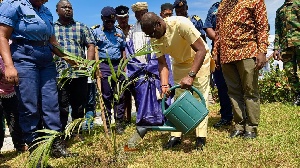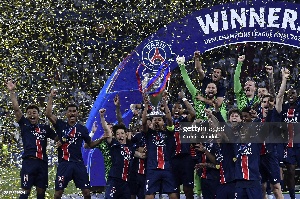- Home - News
- Elections 2024
- News Archive
- Crime & Punishment
- Politics
- Regional
- Editorial
- Health
- Ghanaians Abroad
- Tabloid
- Africa
- Religion
- Photo Archives
- Press Release
General News of Thursday, 5 June 2025
Source: www.ghanawebbers.com
Planting for the Future: Forest clubs and tree planting drive to combat environmental damage
The Western Regional Minister, Joseph Nelson, has urged community leaders to work together. He wants them to help identify illegal miners and restore land. This call comes as concerns grow over illegal small-scale mining (galamsey) in Ghana. The effects on forest reserves and ecosystems are particularly severe in the Western Region.
"The impact of galamsey on our forest reserves is clear," Nelson stated. He encouraged stakeholders, including miners, to partner with the Western Regional Coordinating Council (WRCC). Their goal is to restore degraded lands through tree planting.
In response to environmental degradation, the WRCC recently planted 100 Royal Palms at the Ghana Navy Base in Sekondi. They plan to plant an additional 3,000 trees in the Subri Forest Reserve. These efforts align with World Environment Day's theme: "Restoring Degraded Landscapes." They also support Ghana’s Sustainable Development Goal 15 for ecosystem management.
Elikem Kotoko, Deputy CEO of the Forestry Commission, proposed creating forest clubs across seven forest zones. This initiative aims to promote conservation among young people.
“To instil a culture of forest protection, we propose establishing forest clubs,” Kotoko said. He believes these clubs can work alongside groups like the Boys’ Brigade and Red Cross. They will help foster environmental stewardship among youth.
Kotoko also suggested organizing forest festivals to boost eco-tourism and raise awareness about conservation benefits.
Karpowership Ghana supports national restoration efforts by committing to environmental stewardship. As part of its green recovery agenda, it has planted over 11,000 trees in strategic reserves like Chipa and Subri Forest Reserves.
Sandra Amarquaye, Communications Manager for Karpowership Ghana, shared plans for more tree planting. “We’re planting an additional 3,000 trees—100 at the Ghana Navy Base and 2,900 in Subri Forest Reserve,” she said. This effort is made possible through a partnership with the Ghana Navy.
Ghana’s evolving environmental strategy emphasizes action over words. It focuses on collaboration among stakeholders and engaging youth in conservation efforts. The push for forest clubs and extensive tree planting shows a commitment to reclaiming degraded lands and protecting natural heritage for future generations.











